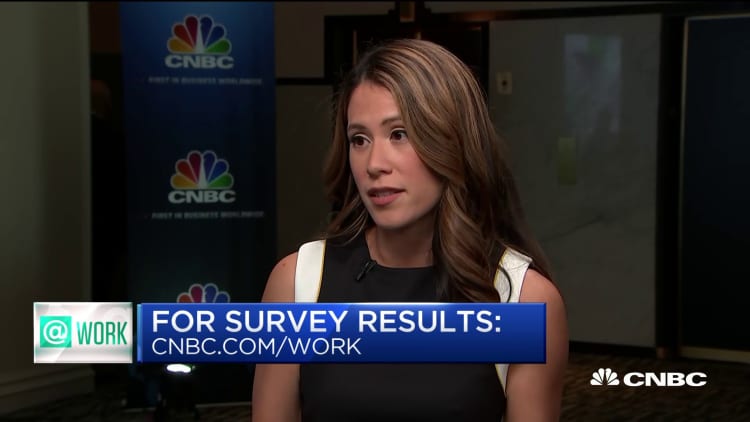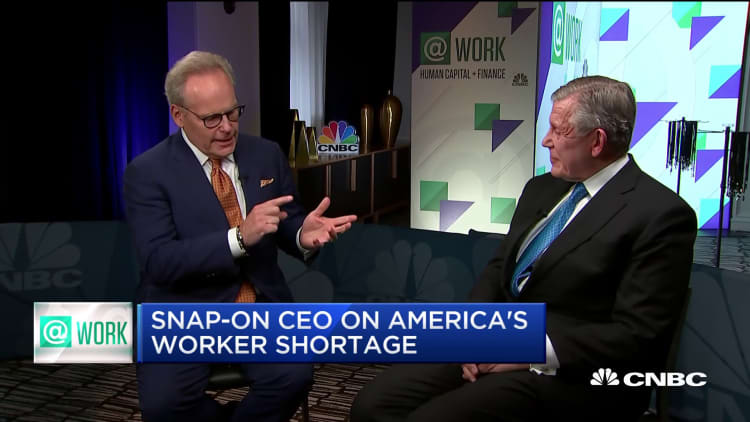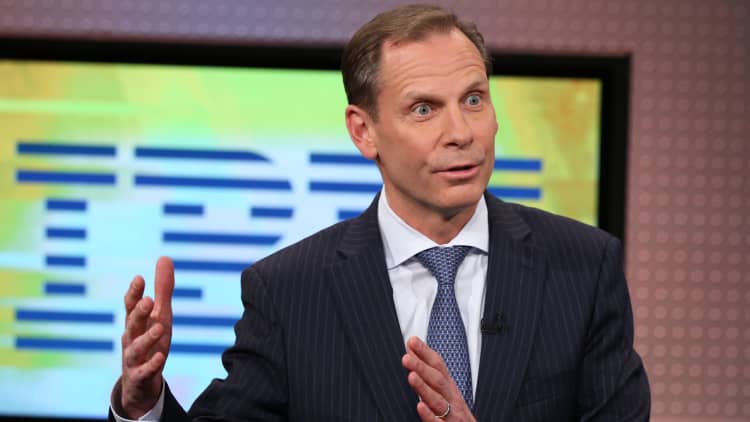
About half of workers say they have a mentor at work, and those who do are significantly more likely to be happy with their jobs, according to the latest CNBC/SurveyMonkey Workplace Happiness Survey.
Digging into the data from nearly 8,000 full- and part-time workers across the country, one of the findings that jumps out: Mentorship has an outsize impact on a worker's career across several measures. More than 9 in 10 workers (91%) who have a mentor are satisfied with their jobs, including more than half (57%) who are "very satisfied."
Among those who don't have a mentor, each of those numbers drop by double digits.
The value of mentorship shows up in more specific ways as well. Workers with a mentor are more likely than those without to say they're well paid (79% vs. 69%) and to believe that their contributions are valued by their colleagues (89% vs. 75%) — two key components of overall happiness at work.
The CNBC/SurveyMonkey Workplace Happiness Survey was conducted by SurveyMonkey from June 21–30, 2019, among a national sample of 7,940 workers in the U.S., with a margin of error +/-1.5 percentage points.
Mentors are perhaps most valuable in providing guidance about how to get ahead at work and how to climb the corporate ladder. Seventy-one percent of employees with a mentor say their company provides them with excellent or good opportunities to advance their career, while just 47% of those without a mentor say the same. Having someone who knows the ins and outs of an organization — how to get attention for your work or how to get put on that plum assignment — can be invaluable for someone looking to get a promotion or take on new responsibilities.
But the benefits of mentorship aren't exclusive to the mentee. Happy, more productive workers are valuable to any company for the simple fact they tend to stay longer. More than 4 in 10 workers who don't have a mentor say they've considered quitting their job in the past three months, compared with just 25% of those who do have a mentor.
Often, the margins between those who have a mentor and those who don't exceed the margins between workers who think of themselves as "very well paid" and those who say they're just "somewhat" or even "not so well paid." At every income level, more workers who have a mentor say they're satisfied with their job than those who don't have a mentor. Mentorship is free, but in terms of workplace happiness, it's akin to giving workers a salary bump.
More from @Work
Here is what makes workers the happiest at every age
A third of US worker seriously considered quitting their job in the last 3 months. Here's why
Dell and Microsoft pour millions into A.I. start-ups that are reshaping the workforce
Who's most likely to have a mentor at work

The benefits of mentorship are clear, so why doesn't everyone have a mentor? Companies often create mentorship programs, but individuals may be left to choose for themselves whether they want to participate. And simply being assigned a mentor likely isn't enough to foster a real difference in happiness at work via any of the measures noted above.
The data show that while the benefits of mentorship hold among all demographic groups, some workers are still more likely than others to have mentors.
For example, women are more likely than men to have a mentor (54% vs. 48%); Asians, Hispanics and African Americans are more likely than whites to have a mentor (58%, 55%, 53% and 49%, respectively); and younger workers are more likely than older workers to have a mentor (66% of 18- to 24-year-olds vs. 38% of 55- to 64-year-olds, for example).
Recent pushes for better diversity and inclusion across the workforce may be helping to drive these mentorship gaps. Facebook chief operating officer Sheryl Sandberg's organization Lean In, for example, advocates for working women in part by facilitating mentorship groups (or "circles") that women can turn to for advice when they need it. Lean In's recent #MentorHer campaign was even more explicit about the organization's goal to drive mentorship opportunities for women — particularly from male leaders, who historically have outnumbered women at the highest levels of the corporate ladder.
Mentorship is free, but in terms of workplace happiness, it's akin to giving workers a salary bump.
While people in some groups are more likely than others to have mentors, the value of mentorship within every demographic cut is consistent: Mentorship makes a difference no matter someone's age, race or gender.
For example, 88% of white men ages 18 to 34 who have a mentor say they're satisfied with their job, compared with 66% who don't have a mentor. Similarly, 95% of non-white women ages 45 to 54 who have a mentor say they're satisfied with their job, compared with 82% who don't have a mentor.

Drilling into the data across demographic characteristics, it becomes clear that the payoff is especially high for younger workers and those at lower levels within organizations. Workers under age 45 who have a mentor report being satisfied with their job by margins of up to 20 percentage points higher than workers of the same age who do not have mentors. That margin decreases with age.
This is intuitive, as the idea of mentorship typically implies that a mentor is an older, more experienced advisor who can share his or her wisdom with a younger, greener mentee. More experienced workers are more likely to be in the opposite position: sharing their own wisdom rather than benefiting from the tutelage of others. But it's not just young people who reap the gains of mentorship.
Mentorship makes work better for all employees
The benefits of mentorship extend to employees well beyond the early stages of their careers. At every step on the job ladder, from individual contributor through vice president, employees who have a mentor are more likely than those who don't to say that they are satisfied with their job, that their company provides opportunities to advance their career, that their contributions are valued by others, that they have recently been considered for a promotion and that they haven't considered quitting their job in the last three months.
The differences are greatest for those at the lower rungs, but the margins for more experienced workers are still substantial.
Of course, there is no one single way to measure happiness at work, and mentorship can't solve every problem an employee will encounter on the job. But the consistent impact that mentorship has for the happiness of workers across every demographic group and role within a company provides encouraging evidence. Business leaders who want to make life better for their workers can consider more ways to encourage mentorship for employees at all levels.
And they could start with themselves and their peers. Just 31% of workers in the highest echelon — the owners, presidents and C-suite executives who are making the biggest business decisions — say they have a mentor at work. They might be better off if they did.
—By Laura Wronski, senior research scientist, SurveyMonkey, and Jon Cohen, chief research officer, SurveyMonkey





